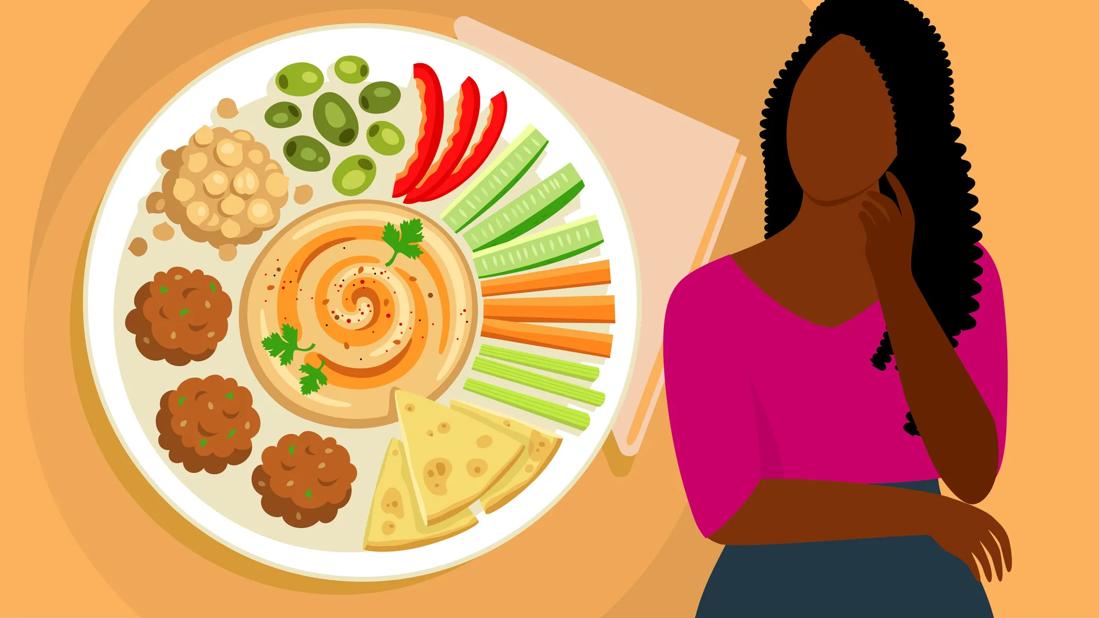This Mediterranean puree may bolster your heart health, digestive function and blood sugar management

Open the fridge in any American household, and you’ll typically find condiment staples like ketchup, ranch dressing and salsa. And in 1 out of 4 of those refrigerators, you’ll also find hummus.
Advertisement
Cleveland Clinic is a non-profit academic medical center. Advertising on our site helps support our mission. We do not endorse non-Cleveland Clinic products or services. Policy
In recent years, hummus has become a popular party dip and snack. But this Mediterranean puree isn’t just for family gatherings or an occasional nosh — it can be used in various ways and may offer health benefits.
“People who eat hummus get great nutritional variety,” says registered dietitian Kate Patton, MEd, RD, CSSD, LD. “It provides added fiber, protein, vitamins and minerals you may not get from mayonnaise or other condiments.”
But there’s a fine line between gaining health benefits from hummus and overeating it. Patton shares what you need to know.
Hummus is a smooth, creamy puree that’s traditionally part of a Mediterranean diet. It’s made from:
“Hummus is a healthy plant-based food you can easily adapt to your taste,” Patton says. “Pairing hummus with vegetables creates a nutritious snack or meal.”
Hummus’s nutritional information can vary depending on whether it’s homemade or store-bought. The ingredients and brand also play a role. A 2-tablespoon serving of store-bought hummus has 71 calories and may contain:
Advertisement
“It’s best to think of hummus as an added fat,” Patton says. “But because it has garbanzo beans, you also get fiber and protein, so you digest it more slowly.”
Hummus delivers a variety of essential vitamins and minerals, such as iron, manganese, copper and folate. Although a 2-tablespoon serving doesn’t contain a lot of these nutrients, it offers more than you’ll find in other spreads or dips.
Putting hummus on bread instead of butter, jam or mayonnaise has several benefits: It increases protein, fiber and essential minerals while reducing calories, saturated fat, salt and sugar. Research even shows that hummus is more nutrient-dense than other “healthy” condiments, including bean dip, salsa and peanut butter.
But if you don’t manage your portion of hummus, you can take in more fat than you realize. “Tahini is a healthier plant-based fat, and extra virgin olive oil is a great source of monounsaturated healthy fat,” Patton shares, “but sometimes, people don’t realize how much fat they are consuming from the sesame seeds and oil in hummus.”
The bottom line? Hummus is a better choice than other dips and spreads — but eat it in moderation to gain the most health benefits.
When you eat hummus in moderation as part of a healthy diet, the benefits may include:
The ingredients in hummus are low glycemic index (GI) foods because they’re low in sugar and are slowly digested. Low GI foods release glucose (sugar) into your bloodstream more slowly — avoiding a spike in blood sugar. The combination of ingredients gives hummus a lower GI than chickpeas alone.
“Fiber and protein help stabilize blood sugar levels,” Patton explains. “Eating a diet containing low GI foods can help you maintain a healthy weight. As a result, you can decrease your risk for Type 2 diabetes and cardiovascular disease.”
There’s limited research on hummus and heart health, but the ingredients in hummus may help reduce your risk for heart disease:
Advertisement
“You can also boost your benefit with healthy add-ins,” Patton suggests. “Common hummus additions, such as garlic, also protect your heart health.”
Hummus provides nearly 2 grams of fiber per serving. While that may not seem like a lot, Patton says that most people need to add fiber wherever possible.
The American Society for Nutrition reports that only 7% of adults get the recommended daily amount of fiber — 14 grams per every 1,000 calories. Fiber helps soften stool (poop) and enables regular bowel movements. Research shows that people who eat chickpeas as part of their diet tend to have bowel movements more often without as much strain or pain.
The protein and fat in hummus also make it better for digestion. As a dense food, hummus takes longer to digest, giving your body more time to absorb nutrients.
Patton offers some tips for incorporating hummus into your diet:
Advertisement
“Adding a moderate amount of hummus to a healthy diet — or using it instead of less healthy condiments — is a great way to enhance your nutrition,” she adds.
Advertisement

Sign up for our Health Essentials emails for expert guidance on nutrition, fitness, sleep, skin care and more.
Learn more about our editorial process.
Advertisement

The tropical fruit is a good source of antioxidants and vitamin C

High amounts of cholesterol and saturated fat in red meat may be linked to heart disease

The leaves and pods from this tree are rich in essential nutrients

This starchy root vegetable is a staple in many global cuisines — but it has to be prepared correctly, or it can cause serious concerns

These delicate green sprouts can give you an extra dose of vitamin K and other nutrients — but they’re not safe for everyone

Edamame, lentils and chicken breast are good sources of protein

Eating this root vegetable can help support your eye, heart and brain health

The flavorful herb is full of antioxidants that may help regulate blood sugar

Even small moments of time outdoors can help reduce stress, boost mood and restore a sense of calm

A correct prescription helps your eyes see clearly — but as natural changes occur, you may need stronger or different eyeglasses

Both are medical emergencies, but they are very distinct events with different causes